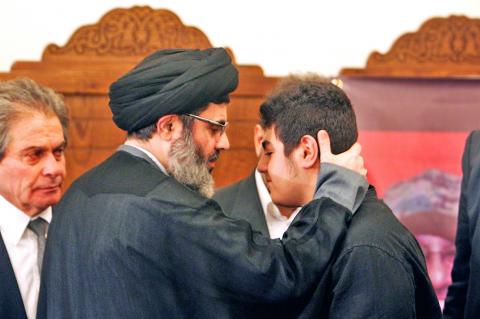Top Hezbollah commander Mustafa Badreddine has been killed in an attack in Syria, the Lebanese Shiiite group said yesterday, the biggest blow to the Iranian-backed organization since its military chief was killed in 2008.
Badreddine, 55, was one of the highest-ranking officials in the group, and was believed by the US government to be responsible for Hezbollah’s military operations in Syria, where it is fighting alongside Syrian President Bashar al-Assad.
The killing of Badreddine, a brother-in-law of late Hezbollah military commander Imad Moughniyah, is the latest big loss sustained by the group and Iran in Syria, despite Russian military intervention in support of al-Assad and his allies.

Photo: Reuters
At least four prominent figures in Hezbollah have been killed since January last year. A number of high-ranking Iranian officers have also been killed, either fighting Syrian insurgents or in Israeli attacks.
Hezbollah said Badreddine had been killed in a big explosion targeting one of its bases near Damascus airport, and an investigation was under way into whether it was caused by an airstrike, a missile attack or artillery bombardment. It did not say when he was killed.
Nawar al-Saheli, a Hezbollah member of Lebanon’s parliament, said Israel was behind the killing.
“This is an open war and we should not preempt the investigation, but certainly Israel is behind this,” he told the Hezbollah-controlled al-Manar TV station. “The resistance will carry out its duties at the appropriate time.”
The Lebanese TV station al-Mayadeen reported Badreddine had been killed in an attack by Israel, which has struck Hezbollah targets in Syria several times since the conflict began in 2011.
There was no immediate response from Israel, which deems Hezbollah its most potent enemy and worries that it is becoming entrenched on its Syrian front and acquiring more advanced weaponry.
Hezbollah has grown stronger since forcing Israel to end its 22-year occupation of southern Lebanon in 2000. The two sides fought a 34-day war in 2006, their last major conflict.
When asked by an interviewer on Israel Radio about possible Israeli involvement, Israeli Minister of Jerusalem Affairs Zeev Elkin, a confidant of Prime Minister Benjamin Netanyahu, declined to comment.
Yaakov Amidror, a former national security adviser to Netanyahu, said Badreddine’s killing was good news for Israel, but stopped short of saying Israel was responsible.
“We don’t know if Israel is responsible for this,” he told Israel’s Army Radio. “Remember that those operating in Syria today have a lot of haters without Israel.”
“But from Israel’s view, the more people with experience, like Bad-reddine, who disappear from the wanted list, the better,” he said.
A US Department of the Treasury statement detailing sanctions against Badreddine last year said he was assessed to be responsible for the group’s military operations in Syria since 2011, and he had accompanied Hezbollah leader Sayyed Hassan Nasrallah during strategic coordination meetings with al-Assad in Damascus.
Al-Manar TV said Badreddine was to be buried at 5:30pm in the southern suburbs of Beirut.

CHIP WAR: The new restrictions are expected to cut off China’s access to Taiwan’s technologies, materials and equipment essential to building AI semiconductors Taiwan has blacklisted Huawei Technologies Co (華為) and Semiconductor Manufacturing International Corp (SMIC, 中芯), dealing another major blow to the two companies spearheading China’s efforts to develop cutting-edge artificial intelligence (AI) chip technologies. The Ministry of Economic Affairs’ International Trade Administration has included Huawei, SMIC and several of their subsidiaries in an update of its so-called strategic high-tech commodities entity list, the latest version on its Web site showed on Saturday. It did not publicly announce the change. Other entities on the list include organizations such as the Taliban and al-Qaeda, as well as companies in China, Iran and elsewhere. Local companies need

CRITICISM: It is generally accepted that the Straits Forum is a CCP ‘united front’ platform, and anyone attending should maintain Taiwan’s dignity, the council said The Mainland Affairs Council (MAC) yesterday said it deeply regrets that former president Ma Ying-jeou (馬英九) echoed the Chinese Communist Party’s (CCP) “one China” principle and “united front” tactics by telling the Straits Forum that Taiwanese yearn for both sides of the Taiwan Strait to move toward “peace” and “integration.” The 17th annual Straits Forum yesterday opened in Xiamen, China, and while the Chinese Nationalist Party’s (KMT) local government heads were absent for the first time in 17 years, Ma attended the forum as “former KMT chairperson” and met with Chinese People’s Political Consultative Conference Chairman Wang Huning (王滬寧). Wang

CROSS-STRAIT: The MAC said it barred the Chinese officials from attending an event, because they failed to provide guarantees that Taiwan would be treated with respect The Mainland Affairs Council (MAC) on Friday night defended its decision to bar Chinese officials and tourism representatives from attending a tourism event in Taipei next month, citing the unsafe conditions for Taiwanese in China. The Taipei International Summer Travel Expo, organized by the Taiwan Tourism Exchange Association, is to run from July 18 to 21. China’s Taiwan Affairs Office spokeswoman Zhu Fenglian (朱鳳蓮) on Friday said that representatives from China’s travel industry were excluded from the expo. The Democratic Progressive Party government is obstructing cross-strait tourism exchange in a vain attempt to ignore the mainstream support for peaceful development

ELITE UNIT: President William Lai yesterday praised the National Police Agency’s Special Operations Group after watching it go through assault training and hostage rescue drills The US Navy regularly conducts global war games to develop deterrence strategies against a potential Chinese invasion of Taiwan, aimed at making the nation “a very difficult target to take,” US Acting Chief of Naval Operations James Kilby said on Wednesday. Testifying before the US House of Representatives Armed Services Committee, Kilby said the navy has studied the issue extensively, including routine simulations at the Naval War College. The navy is focused on five key areas: long-range strike capabilities; countering China’s command, control, communications, computers, cyber, intelligence, surveillance, reconnaissance and targeting; terminal ship defense; contested logistics; and nontraditional maritime denial tactics, Kilby